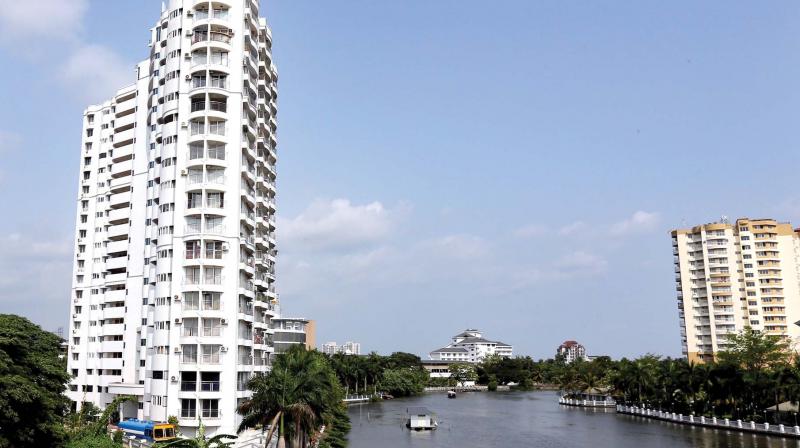Kochi: Flat owners await judgment day

Kochi: A Damocles sword is hanging over the 350 families living in five apartment complexes of Maradu Municipality. They are pinning their hopes on the Supreme Court giving a favourable decision on the review petition filed by builders of the apartment complex seeking reconsideration of the earlier judgment ordering the demolition of the buildings.
The residents are hoping that the Supreme Court will take into account that they have become victims, unwittingly, to a skewed interpretation of coastal zoning rules by local bodies and the tussle between Maradu and the Kerala Coastal Zone Management Authority (KCZMA).
The review petition, filed by one of the builders the other day in the apex court, has highlighted the fact that KCZMA has not mentioned that Maradu belongs to CRZ-II category as per the Coastal Zone Management Plan (CZMP) approved by the Ministry of Forests Environment and Climate Change.
In 2006, Maradu, which was then a panchayat, issued permits to build apartments. As a panchayat, it was the competent authority and flat buyers had no reason to suspect anything unforeseen.
Alfa Serene, one of the builders which submitted the plan and application to Maradu panchayat, maintains that it was competent to issue the permit as its area fell under Coastal Regulation Zone II. The panchayat took the same stance before the High Court in writ petition (No 22590 of 2007). KCZMA was made a respondent in the writ petition on October 26, 2007. It did not file any counter affidavit to the stand taken by Maradu panchayat. The writ petition was disposed of in 2012 in favour of the builders.
Most owners purchased flats in good faith with little inkling of legal issues, gradually cropping up among builders, Maradu panchayat and KCZMA. They had not encountered any hassles from banks and other financial institutions who found the loan applications perfectly in order on legal scrutiny.
Maradu comes under CRZ II. As per CRZ norms, developed area is classified as CRZ II and construction activities are allowed up to the shoreline landwards of the existing or proposed road or nearby building line.
The developed area is referred to as that area within municipal limits or in other legally designated urban area, which is already substantially built up and provided with drainage, approach roads and other infrastructural facilities such as water supply and sewage mains.
Maradu comes under the definition of area ‘substantially built-up’ as it forms part of Greater Cochin Development Authority which comprises Kochi Corporation, nine municipalities and 21 panchayats.
Kerala Municipality Building Rules govern Maradu panchayat.
Coastal Zone Management Plan of Kerala State in 1996 was prepared on 1:12500 scale and the State Government had submitted before the High Court that it would be difficult to arrive at exact conclusions on CRZ status based on this scale (Citizens Interest Agency v Lakeshore Hospital and Research Centre Pvt Ltd 2003(3) KLT 424).
The Ministry of Environment and Forest directed the State Government vide letter dated January 4, 1999 to prepare local-level CRZ map on the cadastral scale 1:3960 to ascertain CRZ status. This exercise did not take place until 2014, when the status of Maradu finally became CRZ II.
In 2012, Maradu municipality did a volte face saying that Maradu was in CRZ III in 2006 and not CRZ II during the time permit was granted. But this ignores that fact that residents have been staying in the flats since 2012.
Owners are wedged between the government agencies and builders. With SC orders, it is the flat owners who are called upon to bear the brunt of court verdict. Hapless individual owners have to pay the price for the bungling on the part of the panchayat and KCZMA.
In the litigation at the SC, the municipality and KCZMA had played roles of appellants and respondents, a situation where one arm of the government tried to take away the approval given by another. What is most intriguing for owners is that in the latest notification, Maradu has been declared CRZ II. This means that new constructions up to the shoreline are possible.
Residents in the flats wonder if it would not harm ecology by razing existing complexes and setting up new buildings in their place. More than 350 flat owners face the prospect of their homes being razed, banks knocking at their doors (before demolition) demanding repayment and in the event of their inability to pay, face other long and costly legal proceedings initiated by banks.
Maradu municipality, then panchayat, which issued permits, is now bent upon demolition of the apartments, a case of running with the hare and hunting with the hound.

